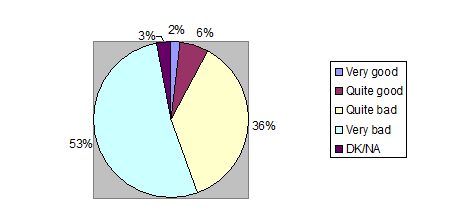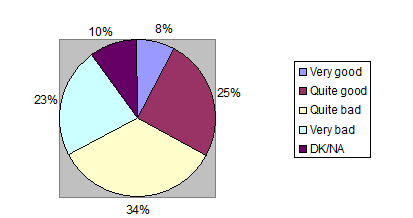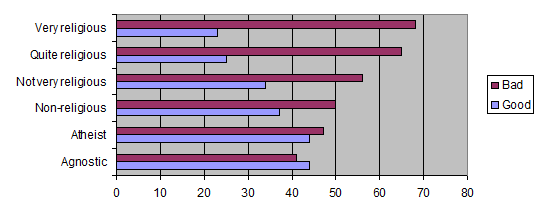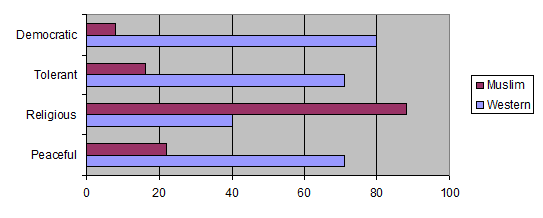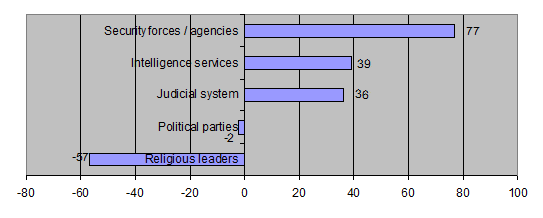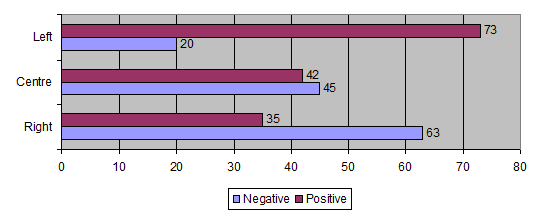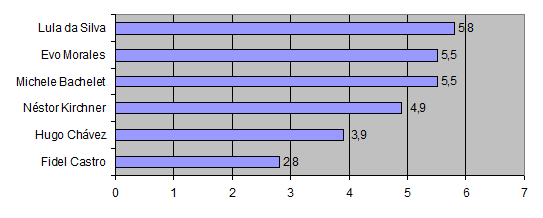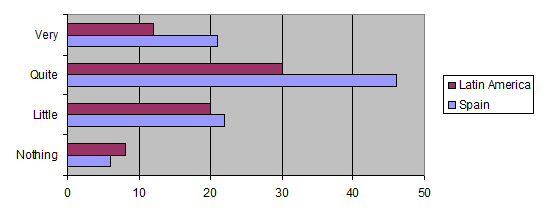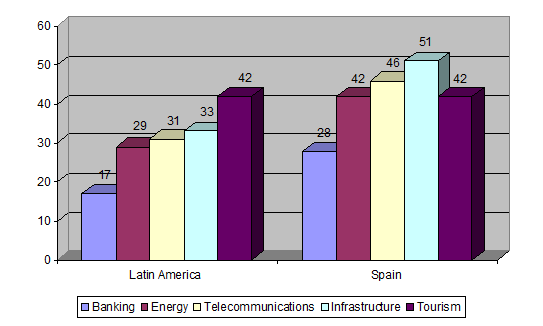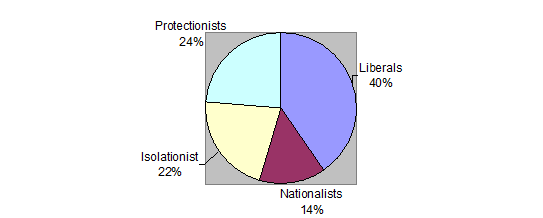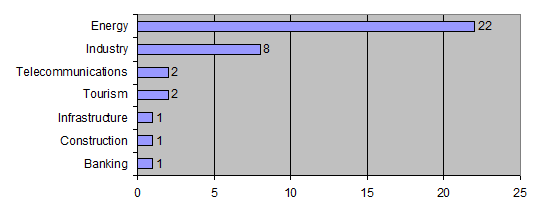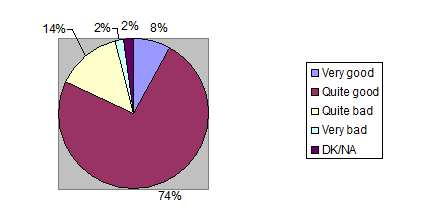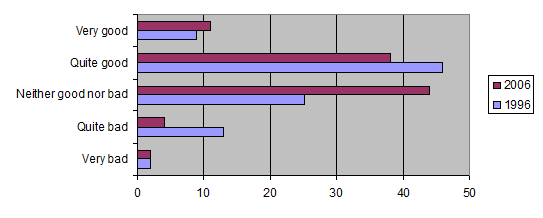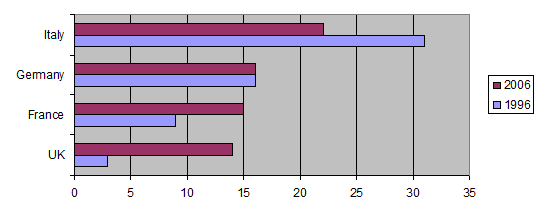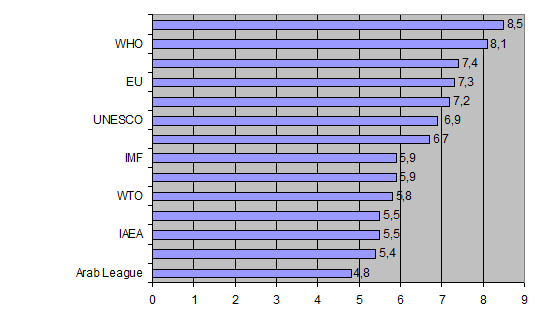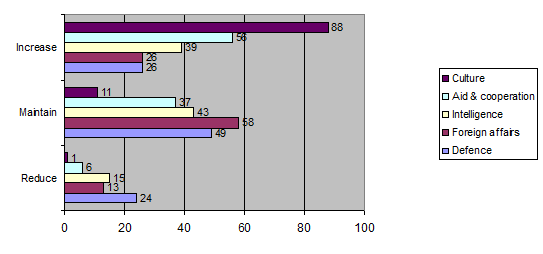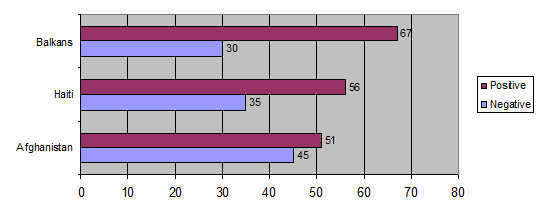ELEVENTH EDITION OF THE BAROMETER OF THE ELCANO ROYAL INSTITUTE (March 2006)
Press Summary
Technical data
- Universe: Spaniards of both sexes, 18 years of age and older.
- Sample area: National. All Regions (‘Autonomous Communities’) including Ceuta and Melilla.
- Sample size: 1,202 interviews.
- Sample structure: Stratified multi-stage. Proportional, according to the double criteria of size of the population of each Autonomous Community, with proportional quotas according to the age and sex of the population applied at the individual level.
- Sample error: ±2.9% (1,200n) for global data, p = q = 0.5 and a confidence interval of 95.5%.
- Methodology used: Computer-assisted telephone interview (CATI system); call to home of interviewee.
- Survey period: Field work was carried out between March 10 and June 24.
- Field work: TNS – Demoscopia.
1. SPANIARDS ARE CONCERNED ABOUT THE DIFFERENCES BETWEEN MUSLIM AND WESTERN COUNTRIES
- Spaniards have a negative opinion of the ‘cartoon crisis’ as a whole. They are very critical of the violent response in Arab societies: 88% have a negative opinion of their reaction.
- 57% also have a negative opinion of the publication in certain European media of the cartoons depicting Mohammed.
The main factor determining opinions on the cartoons is how religious a given respondent is: the more religious respondents are, the more negative their reactions tend to be. 41% of agnostics have a negative opinion of the cartoons, compared with 70% of ‘very religious’ respondents.
- In any case, regardless of their religious convictions, the democratic principles of Spaniards remain clear. Even among those who do not like the cartoons, 72% believe that freedom of expression must prevail, compared with only 14% who consider respect for religions to be more important.
- Following the violent reactions in some Muslim countries, their negative image has come to the fore:
- 90% were considered authoritarian
- 79%, intolerant
- 68%, violent
- This image is in contrast with the image of the Western nations –which seem to be the antithesis of Muslim countries–: 80% of respondents consider them democratic and 70% peaceful and tolerant.
2. THE ALLIANCE OF CIVILISATIONS IS A SOLUTION
As a result of these differences, 74% believe that a ‘clash of civilisations’ does indeed exist, while only 22% reject this idea.
This perception is more a reflection of the fear that it may come about rather than a diagnosis of the situation, since 63% also think that there are differences between Muslim countries themselves. This is also true of Western countries: 72% think that there are differences among them.
Also, a very high percentage (38%) feels that the reaction in Muslim countries was not entirely spontaneous, but was manipulated by their governments.
However, there is optimism regarding solutions. 61% feel that ‘Prime Minister Rodríguez Zapatero’s proposal of an Alliance of Civilisations could help in the fight against international terrorism’, compared with 32% who are in disagreement.
More Spaniards believe that his proposal ‘has been well received in other countries’ than otherwise: 44% compared with 33%.
As for the fight against international terrorism in Spain, 88% have a positive opinion of the national security forces and agencies, and also of the judicial system (66%) and the intelligence and espionage services (63%).
There is a proportionally negative opinion of Islamic religious leaders: 75% of respondents believe they play a negative role. By contrast, opinion is divided regarding political parties: 46% have a positive opinion of them, compared to 48% who have a negative view.
Comparing positive and negative opinions, what is perhaps most striking is the excellent score received by the intelligence services –second only to the national security forces and agencies– despite how little information is necessarily available on these services. This good impression perhaps reflects the importance placed on the information that has led to the dismantling of Islamist recruitment networks in Spain.
3. OPTIMISM ON LATIN AMERICA
A majority (69%) feel that ‘Latin America is turning to the left’.
55% ‘consider this good for Spanish interests in the region’, although 38% consider it negative.
Predictably, these responses reflect the political opinions of the respondent. Among those on the left, 73% think it is positive, while 63% of those on the right think it is negative.
In general, the Spanish population, which defines itself as centre-left, has a good impression of the new Latin American leaders. On a scale of 0 to 10, both Michele Bachelet and Evo Morales received 5.5, far above the very low scores given to Castro (2.8) and Chávez (3.9), but also above Kirchner (4.9), who met with greater indifference and also proved to be less well known, despite having been longer in power.
67% believe that the ‘investment of Spanish capital in Latin American countries has been beneficial for their development’. Spaniards have a better opinion of these investments than Latin Americans: their opinion was shared by only 42% of Latin American respondents interviewed by the Latinobarómetro at the initiative of the Elcano Royal Institute in 2005.
Infrastructures and transport (51%) and telecommunications (46%) were identified as the ‘sectors in which Spanish companies can contribute most to the development of Latin American countries’. By contrast, the least mentioned sector was banking (28%).
42% mentioned tourism, exactly the same percentage as Latin American respondents did. The latter, however, disagree with Spaniards’ opinions about the other sectors, mainly because they are not so enthusiastic about the benefits these investments have brought to their countries. In fact, Latin Americans and Spaniards diverge the most in the two sectors that the latter consider essential: infrastructures and telecommunications.
Source: BRIE-11 and Latinobarómetro/Elcano Royal Institute.
4. OPINIONS ON PROTECTIONISM
Continuing with investments, 59% think that ‘in order to grow, Spanish companies have the right to absorb and control companies in other countries’, while 36% disagree.
As to whether ‘the Spanish government should prevent the control of Spanish companies by companies from other countries’, there is even greater disagreement: 44% say yes, while 51% say no.
Combining the two questions would give us a typology of Spaniards, whom we could at least provisionally describe as:
- Liberals: against protection and in favour of external expansion (40%).
- Protectionists: in favour of external expansion, while protecting the Spanish market (24%).
- Isolationists: against expansion and in favour of protection (22%).
- Nationalists: against protection but also against external expansion (14%);
In any case, Spaniards do tend to agree that the sectors that should be protected are energy (22%) and industry (8%).
Attitudes to protectionism are not affected by the country of origin of foreign companies, as percentages do not change even for European Union countries.
6. SPAIN HAS MORE FRIENDS IN EUROPE
Although the question of protectionism has also become part of the debate on the future of the European Union, 82% of Spaniards feel that the state of the Union is good.
Half (49%) believe that ‘Europeans have a good opinion of Spain as a country’, while only 5% think they have a bad opinion.
Spaniards seem surer of themselves than ten years ago. In 1996, a IUOG/ Demoscopia study showed that 10% of Spaniards thought Europeans had a poor opinion of them.
Asked ‘which European country is the friendliest to Spain’, Spaniards said Italy (22%), followed by Germany, France and the UK, all mentioned by 15% of respondents.
In comparison with the results of the 1996 IUOG/ Demoscopia survey, Italy dropped by ten points from 31%, while the UK rose sharply from 3% and France also rose, but less dramatically, from 9%. It could be concluded that Spaniards feel better integrated because they feel they have more friends in Europe.
However, the attribution of antipathy has changed far less. In 2006 the countries considered to dislike Spain the most are France (37%) and the UK (22%). This remains practically unchanged since 1996, when 37% mentioned France and 27% the UK.
But there is a very high opinion of the European Union as a whole, which scored 7.2 on a scale of 0 to 10.
7. ACTIVE MULTILATERALISM
In general, Spaniards have a positive opinion of all international organisations. Of the fourteen they were asked about, only the Arab League was given a score below 5.0. Despite criticism from the anti-globalisation movement, the World Trade Organisation, the World Bank and the International Monetary Fund are seen in a positive light, each receiving 6 points.
The top five include the three most widely known NGOs: Amnesty International, Greenpeace and Doctors without Borders, which ranked the highest (8.5).
8. SUPPORT FOR HUMANITARIAN ACTION
Spaniards also display militant multilateralism: 79% believe that ‘for Spain’s future, it is better for us to play an active role in international politics’.
Thus, 56% are in favour of increasing spending on international aid and cooperation, compared with 6% who favour cutting back in this area. This is the item of foreign expenditure most supported by Spaniards.
However, 39% were also in favour of increased spending on intelligence and secret services, more than on diplomacy and defence, on which most would like spending to be merely maintained.
These public spending preferences reflect Spanish pacifism. For instance, regarding the situation created by Iran’s nuclear research programme, 85% prefer economic sanctions, while only 5% favour the use of force.
This does not mean, however, that there is a negative opinion of the presence of Spanish troops on humanitarian missions abroad. Quite the opposite is true, whether in the Balkans, Haiti or Afghanistan.


